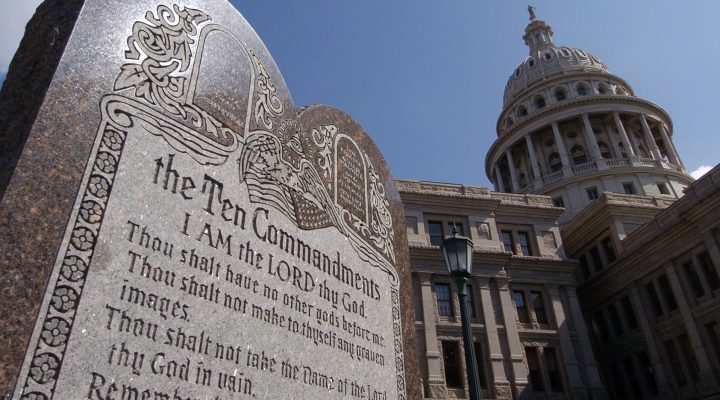As a biblical studies professor, I have noted with interest Senate Bill 1515 in the Texas Legislature to place the Ten Commandments in every public school classroom. But what are the Ten Commandments?
There is no single definitive version of them. They appear in the Bible twice, in Exodus 20 and Deuteronomy 5, with some differences. They also exist in a variety of translations. For example, the King James Version says we shouldn’t kill, while the New International Version says we shouldn’t murder.

Don Polaski
And many of the commandments include additional information that needs to be removed when brevity is important. So when God gives the commandments to Moses in the movie The Ten Commandments, God doesn’t mention all the items you’re supposed to avoid coveting or how honoring your parents will make you secure in the land. The movie already was long enough.
SB-1515 demands schools use the version of the Ten Commandments found on the monument at the Texas Capitol. That version appears to be based on the King James Version and results from a number of editorial decisions.
Here it is (feel free to compare it to a Bible):
The Ten Commandments
I AM the LORD thy God. Thou shalt have no other gods before me.
Thou shalt not make to thyself any graven images.
Thou shalt not take the Name of the Lord thy God in vain.
Remember the Sabbath day, to keep it holy.
Honor thy father and thy mother, that thy days may be long upon the land which the Lord thy God giveth thee.
Thou shalt not kill.
Thou shalt not commit adultery.
Thou shalt not steal.
Thou shalt not bear false witness against thy neighbor.
Thou shalt not covet thy neighbor’s house.
Thou shalt not covet thy neighbor’s wife, nor his manservant, nor his maidservant, nor his cattle, nor anything that is thy neighbor’s.
How would this version fit in a classroom? Should students attempt to read the poster, they would need to negotiate “thy,” “thyself,” “thou,” “thee” and “shalt,” or have a teacher who will delight in explaining the development of the English language. Teachers might also expect questions about numbers: here the Ten Commandments are actually 12 statements, beginning with “I AM the LORD your God” and ending with two separate commands about coveting. But there’s more than math and language arts at stake.
Posting this version of the commandments wrenches them forcibly out of the context of Judaism and of the ancient world. This version omits the mention of God liberating the Israelites from Egypt in the first commandment, an essential claim showing Israelites are to keep these requirements because God has graciously liberated them from Pharaoh.
The commandments speak of the Sabbath, which is a Jewish celebration, but which is often understood as Sunday by Christians. Perhaps the teachers can explain that too, or perhaps they’re Christians who’ve never heard different.
The commandments suggest that, if we obey our folks, we will live well on the land God has given us. What would that mean to a student in Texas schools? Perhaps just that God gave them a nice house in a subdivision outside Waco.
But the guarantee of land mentioned here does not apply to people in general or to Texans, it applies only to Israel. Without that context, the fifth commandment could suggest that God fought alongside Texans against the Mexicans and Native Americans to give white Texans land.
“Teachers will get the opportunity to explain sexual intercourse outside of marriage in a way parents approve.”
What about adultery? In an era of nervousness about sexually explicit instructional resources, teachers will get the opportunity to explain sexual intercourse outside of marriage in a way parents approve.
And, if the students get energetic and read just the book of Genesis, they will find that married Israelite men were allowed to have all sorts of sexual contact outside of marriage: sex with multiple wives (Abraham, Jacob), sex with slaves (Abraham, Jacob), and sex with women they think are prostitutes (Judah). Sex with women taken as captives in war waits until Deuteronomy (21:10-14).
What about coveting? This commandment will certainly inspire a trip to the dictionary. But the command in this version lists wife, male and female slaves, and cattle (a nice tie to Texas!) as the property of your neighbor you should not desire.
Would a student conclude that wives are property? Would a student rightly see that “manservant” and “maidservant” refer to slaves? Would a student note that God is angered by you desiring your neighbor’s slaves, not by your neighbor owning slaves? In Texas it may soon be that the most prominent mention of slavery in the public schools will be a poster in every classroom that presumes its propriety.
The Ten Commandments are not a magical object that produces good citizens. If you read them, you may have questions.
Don Polaski serves as associate professor of religious studies at Randolph-Macon College in Ashland, Va., specializing in the Hebrew Bible and Early Judaism. He holds a Ph.D. from Duke University and a bachelor’s degree from Furman University. He is a square supervisor for the Shikhin Excavation Project (excavating a 2,000-year-old village in Galilee) and a member of Ginter Park Baptist Church (trying to follow a certain Galilean from 2,000 years ago).
Related articles:
Texas Ten Commandments bill is a bad idea, Tyler and Hollman warn
‘Thou shalt not covet thy neighbor’s wife’ and other posters I do not want in a first grade classroom | Opinion by Britt Luby


